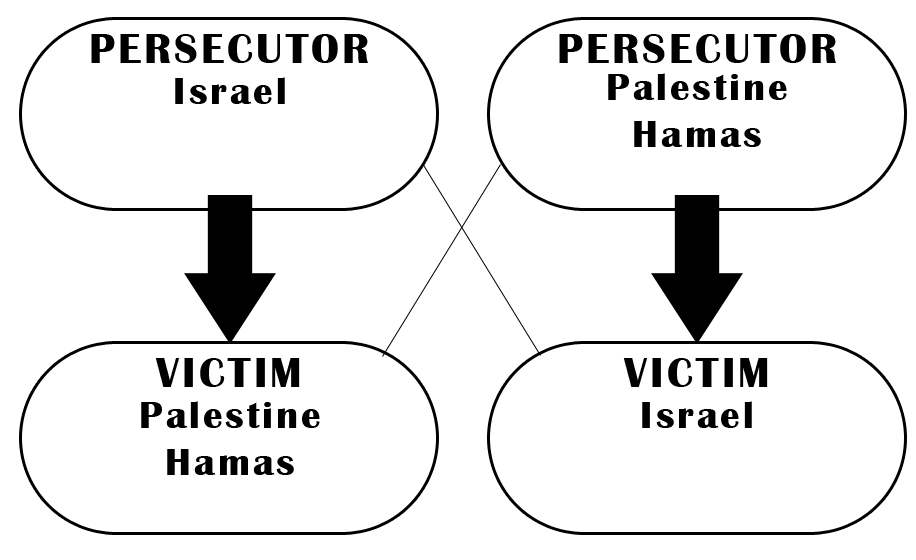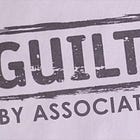Not Condemning Evil Due to Drama
In the Drama Triangle, you don't want nuances...
Why is it so difficult to “acknowledge the evil, and to condemn it” concerning the October 7th attacks? I was reading Georgia McGraw’s article this morning and I had to comment on her article that we should expect people to do this. It 100% should be normal to act shocked and appalled and condemn such evil acts.
That was my first reaction when I heard about and watched videos on the attacks. I was shocked and appalled, but not just about the attacks. People’s responses to the attacks were appalling also. Why are people, not only not condemning it but saying people deserved it?
Why Can’t People Condemn Evil?
I was watching Josh Slocum’s latest Disaffected Podcast episode and he was saying, yes, you can also be upset about things Israel has done in the past but also condemn the evil attacks. Of course, we rational people understand this.
The problem is that people are too caught up in the Drama Triangle. I shared one of these Drama mirror examples related to Trump in a previous article. Basically, some people believe that Israel is a “victim” to the persecutor “Palestine” and others see the situation flipped completely.
Those killed & brutalized were really victims. They were victimized. However, some supporters of Israel believe the entire country to be unable to defend itself and believe they need the US to come in as a “savior.” That would be a drama-triangle perspective.
There’s a slight difference that can be difficult for some to grasp. If the country is taking personal responsibility where it needs to, then it doesn’t see things from inside the drama triangle. If a person believes that the country can take care of itself, but the individual people who were killed or hurt were actual victims, that is not a drama triangle perspective. Hopefully, you all understand the difference by now from reading my Substack. The important part is if people were taking personal responsibility or expecting others to take responsibility for themselves. Desiring the United States to give funds to protect Israel because they can’t do it themselves is a drama-triangle perspective.
And, of course, the mirrored version believes Palestine to be a helpless victim, unable to defend itself, and so they see Israel as the “evil persecutor.” Many social justice warriors want to be their savior, or at the very least ally.
And it looks like we have way more people taking sides in the drama triangle (whichever version they fall into) than sitting on the sidelines discussing the nuances like rational adults.
Black, White, or Grey?
When you are seeing the world from inside the limited perspective of the Drama Triangle, you cannot see the grey areas. You don’t perceive someone as having good and bad traits, you only see them as a binary: good or evil.
This is why people feel as if they cannot say what Hamas did was morally wrong. If they say what Hamas did was morally wrong they’re saying Hamas isn’t an innocent victim here when retaliation happens, and then, maybe, Israel isn’t as 100% evil as they used to believe.
When you start to humanize people (rather than caricaturizing them), then your worldview gets messy. Things start to get more complicated. You can’t feel as certain of things any longer. You can’t feel as if you have “righteous anger” any longer. As the justification for your anger dissipates a little bit, you can’t feel as if you’re doing the correct thing in hating them any longer.
People like painting others as “evil persecutors” because it gives them a reason to vent out pent-up emotions. They can’t do that when there’s a sliver of doubt that the person/country/group is not 100% evil.
Guilt By Association
And, of course, there’s the guilt-by-association fallacy that gets used a lot. Some people think if you say that what Hamas did was wrong, you’re now being associated with Israel, and if Israel is evil, your friends/co-workers/family members, etc. will think you’re evil too. This is a fallacy, but the fear of being lumped into an evil group keeps people from admitting what they know is real. That’s a very common thing happening these days.
I don’t write about this so you can force someone else to be different. People won’t change their minds because emotionally they like the drama and people don’t like to face their fears as I was just saying yesterday. But this should help some of you to better understand what’s going on with their irrationality.
Respect The Danger
The most dangerous people are the ones who will take a side and view another side as a persecutor that they can inflict their repressed anger onto. I don’t want to say, “Be afraid, be very afraid,” but perhaps just be mindful and respect the crazy.
When I was young and around dogs and cats, I respected the damage they could cause. I knew that they could scratch or bite me and hurt me very badly. I didn’t like that that could happen, but I understood it could, and handled them in such a way that they would not view me as a threat. I didn’t antagonize them. What’s interesting to me is that it’s the people inside of the drama triangle who antagonize each other. I sit outside the drama and watch it unfold, but don’t get embroiled in it.
That’s not to say don’t enforce your boundaries. I will always tell people to enforce their boundaries against threats. But there’s a difference between enforcing your home from invaders and traveling thousands of miles to a riot or protest to fight back in someone else’s neighborhood. I hope you can understand the difference.
Enough saying “no” to people who are not respecting boundaries and this stuff never would have gotten to this point. We need a cultural shift where everyone enforces their own boundaries to get any better. But we can only do what we can personally do. Getting embroiled in the drama debates with others online basically just steals your energy and time since you’re not going to change their minds.






It helps keep me sane to know that there are other people, like you Barbara, who understand this.